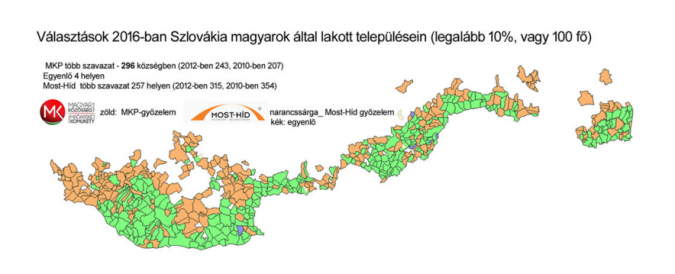In a macabre turn of events, the disastrous results of Slovakia’s parliamentary elections mean that the country’s main Hungarian party, called Híd (Bridge), may end up in an unruly right-wing coalition government with none other than the anti-Hungarian and racist Slovak National Party (SNS – Slovenská národná strana). We provided an analysis of the disturbing results of the Slovak elections in HFP this past Sunday, and we’re now returning to this topic, as Prime Minister Robert Fico’s populist left-centre SMER party lost its majority in parliament and is finding it next to impossible to cobble together a coalition government. As such, the ball is now in the court of the second place Richard Sulík, of the centre-right, anti-migrant and mildly euro-skeptic Freedom and Solidarity party (SAS – Sloboda a Solidarita).
But the only way for Mr. Sulík to form government is to get five other parties on board, including both the Hungarian Híd (which won 6.5% of the vote) and the xenophobic, frequently anti-Hungarian SNS party (8.7%). Béla Bugár, the leader of Híd, has been pretty laconic in the 48 hours since the election, noting not only his own party’s poor result, but also the fact that over 100,000 Hungarian votes were “wasted,” considering the fact the Híd’s rival, the Party of the Hungarian Community (MKP – Magyar Közösség Pártja), once again failed to reach the 5% hurdle required for parliamentary representation. MKP, which campaigned with the support of Hungarian Prime Minister Viktor Orbán’s Fidesz, declared it a compulsory patriotic duty of all “good” Hungarians in Slovakia to vote for the MKP, and openly suggested that Híd was a traitor to the cause of nearly half a million ethnic Hungarians in Slovakia.

The results of Slovakia’s parliamentary elections in southern regions and communities where ethnic Hungarians comprise at least 10% of the local population. The green represents municipalities where the MKP came out on top, while the orange is representative of localities where the Híd party garnered the most Hungarian votes. It should be noted that Híd also manages to win the votes of some ethnic Slovaks, and this is not reflected on this map. Credit: Felvidék.ma
The MKP’s leader, József Berényi, has since resigned, but it is Mr. Bugár who is now left with the entirely unenviable position of being the kingmaker in a coalition that includes far-right extremists who see the ethnic Hungarians of southern Slovakia as a threat to the Slovak nation. Mr. Bugár is also faced with incredible vitriol on his Facebook page, from Slovak nationalists who claim to be “disenchanted” and “disappointed” with Mr. Bugár, for his understandable hesitation to enter into a coalition with the anti-Hungarian far-right.
“I thought that you represent a pragmatic party and that you are a citizen of Slovakia. It turns out that you are just a Hungarian living in Slovakia,” commented one Facebook user on Mr. Bugár’s page, according to a piece in the Hungarian-language Új Szó paper.
Gábor Grendel, an ethnic Hungarian politician affiliated with the conservative Ordinary People and Independent Personalities party (Obyčajní Ľudia a nezávislé osobnosti — OĽaNO), agrees that entering into a coalition with the racist SNS is still the lesser of two evils. “There is simply no good solution, but having a right-wing coalition is still better than any other end result. And it is certainly better than early elections, in which [the neo-Nazi] Marian Kotleba would gain even more votes,” argued Mr. Grendel. The ethnic Hungarian politician was referring to the disturbing entry into parliament of the openly neo-Nazi L’SNS party, with 8.1% of the vote.
The anti-Hungarian SNS, now led by Andrej Danko, is no longer as extreme as it once was under its previous leader, Jan Slota. Back in 1999, Mr. Slota called for the destruction of Budapest, using Slovak tanks. In 2006, Mr. Slota also referred to ethnic Hungarians in Slovakia as “a cancerous tumor on the body of the Slovak nation, which has to be removed as soon as possible.”
The current SNS leader, and many other leading politicians in the party, were already active politically when Mr. Slota made these statements, and the party has never formally distanced itself from its rabidly racist past.
If Mr. Sulík convinces the Hungarians and the anti-Hungarians to join his coalition, then the six parties that form part of this pact would control 76 out of 150 seats in Slovakia’s parliament. That’s just barely a majority. Perhaps Mr. Bugár and his Hungarian counterparts would not have to suffer for long in this type of arrangement after all, as the longevity of such a government is questionable, to say the least.




